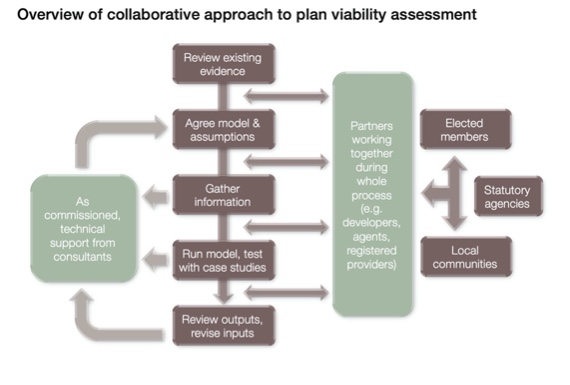Effective participation in stakeholder consultations
A Local Plan viability assessment is required as part of the Plan’s evidence base. It is a collaborative process (see Figure 1) as outlined in the Harman Guide to Local Housing Delivery

Figure 1
Developer consultation events are a vital part of the evidence gathering process. They benefit all parties and lead to a more realistic viability appraisal and more robust deliverable outcomes.
These events are about collection of locally based evidence rather than just an exchange of opinions. Developer feedback is critical – we want to hear how the market operates for housing associations, local and specialist developers as well as for volume builders.
What can you tell us about local costs and their relationship to BCIS data? What density of development works best in urban and rural locations? What are the locations where private rent works (or not)? Are garages (or double garages) key to sales success? How much, and what sort of, affordable housing is currently provided? All these factors impact on viability and vary from place to place.
A consultation event with no participation would be an abject failure. If you attend, please aim to participate. This is a dialogue not a learning exercise.
As organisers we have our part to play – we work hard to create a constructive atmosphere (whether at a virtual or actual event) where everyone gets the opportunity to speak.
However, you can also help yourself to get the most out of the event. Preparation is key and so is agreeing a line within your own organisation.
- The agenda will focus on local build costs, house prices and land values. Choose a subject which interests you, prepare a question in advance, and practice beforehand so you can deliver it smoothly and with confidence. Read Harman if you really want to sound authoritative!
- If your organisation has particular expertise or is aware of issues with development in this neighbourhood (e.g. flood risk or phosphates and you know how much remediation or mitigation costs) then check with your boss that it is alright to do so and come armed with that information, we want to hear it.
- If you are taken by surprise and feel that the consultation workshop is covering subjects you know nothing about, but which will matter to your firm (e.g. new requirements for carbon neutral development) then say something like “I am not expert on this but my colleagues in our XX Dept will have strong views. Can I come back to you with feedback?” It would be an unwise viability consultant who did not take you up on that offer.
- Sometimes other participants can have a lot to say and sound very knowledgeable. In our experience there are often alternative circumstances – it is important that we hear from everyone, not just those who claim to know the industry inside-out.
We are keen to hear from all types of housing providers and everyone involved in the development process. Let us know your experience of stakeholder consultation events and your views on how we could work together to make them better.